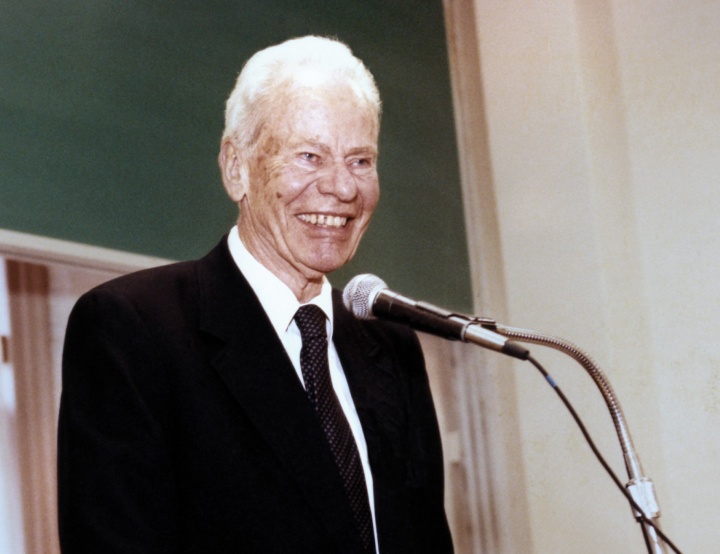Charles L. Van Doren GSAS’59, a Columbia English professor emeritus and a member of a distinguished literary family who confessed to Congress and the nation in 1959 that his performances on a television quiz show had been rigged, died on April 9, 2019, in Canaan, Conn. He was 93.

Van Doren speaking at reunion in 1999.
Van Doren was born in Manhattan on February 12, 1926. He attended the City and Country School and the High School of Music & Art, approaching concert-level talent as a clarinetist. At 16, he undertook the Great Books curriculum at St. John’s College in Annapolis, Md., from which he graduated with honors in 1947, after a break to serve with the Army Air Forces in 1944 and 1945. Van Doren earned a master’s in mathematics from GSAS in 1949. After studies at Cambridge University in England and the Sorbonne in Paris, he returned to New York and in 1955 began teaching at Columbia. He earned a Ph.D. in English literature from GSAS in 1959.
The family name carried weight: Van Doren’s father was Mark Van Doren GSAS 1920, a Pulitzer Prize-winning poet, literary critic and legendary Columbia professor of English. His mother, Dorothy (née Graffe), was a novelist and editor. And his uncle, Carl, had been a professor of literature, a historian and a Pulitzer Prize-winning biographer.
The younger Van Doren captivated audiences from November 28, 1956, to March 11, 1957, on the NBC quiz show Twenty-One. All told, he earned $129,000 (equivalent today to more than $1 million). He appeared on the cover of Time, received fan letters, brushed off marriage proposals and signed a $150,000 contract to appear on NBC shows for three years.
In succeeding months, as rumors and skepticism over TV quiz shows grew, some contestants admitted the programs had been fixed. Van Doren denied it to the press, the public, family, friends and even a Manhattan grand jury. But on November 2, 1959, he told congressional investigators that he had been given questions and answers in advance and had been coached to make his performances more dramatic.
Van Doren, who was highlighted among the show’s many participants because of his family’s prominence, said he agonized to come to terms with his betrayals. Columbia accepted his resignation, NBC canceled his contract and, along with others who had lied to the grand jury about their roles, he pleaded guilty to misdemeanor perjury and received a suspended sentence.
Afterward, Van Doren became an editor and a pseudonymous writer, took a job with Encyclopædia Britannica and moved to its Chicago headquarters in 1965. He became a VP in charge of the editorial department and edited, wrote and co-wrote dozens of books. He also returned to education, teaching English at the University of Connecticut’s Torrington campus, not far from his home in Cornwall. He retired in 1982.
For decades, Van Doren refused to talk publicly about the scandal. He declined to assist in a documentary for the PBS series American Experience in 1992, or in Robert Redford’s 1994 movie, Quiz Show, of which he was the focus.
Van Doren is survived by his wife, Geraldine Ann Bernstein; their children, John C.L. ’84 and Elizabeth; and three grandchildren. His younger brother, John GSAS’52, died in January 2019.
— Lisa Palladino


